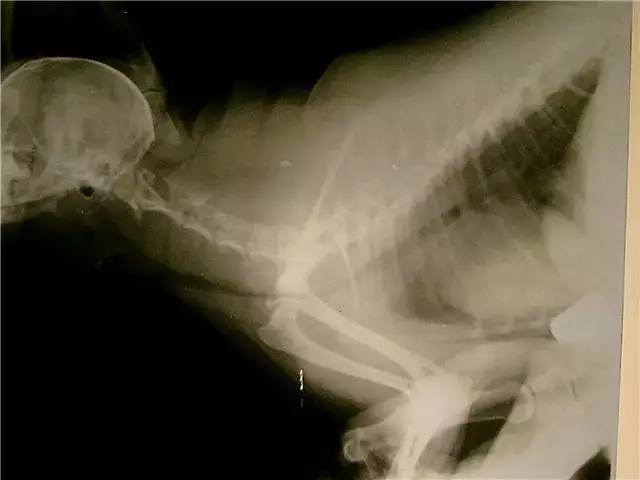- Author Rachel Wainwright wainwright@abchealthonline.com.
- Public 2023-12-15 07:39.
- Last modified 2025-11-02 20:14.
Prajisan
Instructions for use:
- 1. Pharmacological action
- 2. Release form
- 3. Analogs
- 4. Indications for use
- 5. Contraindications
- 6. Application during pregnancy and lactation
- 7. Method of application
- 8. Drug interactions
- 9. Side effects
- 10. Storage conditions
Prices in online pharmacies:
from 183 rub.
Buy
Prajisan is a hormonal medication containing progesterone, which is used for luteal insufficiency.
Pharmacological action of Prajisan
Progesterone (the active component of Prajisan) is a corpus luteum hormone that causes the transition of the uterine mucosa from the proliferation phase to the secretory phase.
Prajisan contributes to:
- Reducing the excitability and contractility of the muscles of the uterus and fallopian tubes;
- Increased glucose utilization;
- Development of a normal endometrium;
- Increasing the production of aldosterone;
- Accumulation of glycogen in the liver.
When Prajisan is used vaginally, progesterone binds to the vaginal mucosa, releasing continuously for at least three days.
Release form
Prajisan is produced as:
- Homogeneous white vaginal gel, 1 g of which contains 80 mg of active substance (progesterone). In vaginal plastic applicators, 1.35 g for single use;
- Light yellow oval capsules with a white oily suspension. Each capsule contains 100 mg and 200 mg progesterone. 10 capsules in a blister.
Prajisan's analogs
The analogs of Prajisan in terms of the active component include Progesterone, Iprozhin, Krainon, Utrozhestan, and in terms of the mechanism of action - Medroxyprogesterone-LENS and Oxyprogesterone capronate.
Indications for the use of Prajisan
Prajisan according to the instructions is indicated for use in the treatment of:
- Infertility caused by luteal insufficiency;
- Secondary amenorrhea and dysfunctional uterine bleeding, which are caused by progesterone deficiency.
In addition, Prajisan is effective for maintaining the luteal phase during the use of complementary methods of reproduction and as hormone replacement therapy in postmenopausal women simultaneously with estrogen medications.
Contraindications
According to the instructions, Prajisan is contraindicated for use with:
- Vaginal bleeding of unexplained etiology;
- Malignant tumors of the genitals or mammary glands, as well as in cases of suspicion of them;
- Porphyrias;
- Incomplete abortions;
- Acute thrombosis or thrombophlebitis, as well as thromboembolic diseases and acute disorders of cerebral circulation;
- Hypersensitivity to progesterone or ancillary components of the medication.
In addition, Prajisan capsules should not be taken against the background of severe liver diseases, including hepatocellular carcinoma, hepatitis, cholestatic jaundice. This caution applies to both current medical conditions and a history of liver function tests that have not returned to normal values.
Prajisan is prescribed with caution against the background of:
- Bronchial asthma;
- Diseases of the cardiovascular system;
- Chronic renal failure;
- Depression;
- Arterial hypertension;
- Diabetes mellitus;
- Migraine;
- Epilepsy;
- Hyperlipoproteinemia.
The use of Prajisan during pregnancy and lactation
The use of Prajisan during pregnancy is not contraindicated, however, the instructions indicate the existing risk when taking the medication in the first four months of pregnancy. According to the results of numerous epidemiological studies, no cases of abnormalities in the development of the child have been identified.
However, it should be borne in mind that Prajisan during pregnancy in the second and third trimesters can cause the development of liver diseases in the expectant mother.
There are no reliable data on the effect of the medication on a child during breastfeeding.
Method of using Prajisan
When using Prajisan in the form of capsules inside against the background of progesterone deficiency, as a rule, a daily dose of 200-300 mg is prescribed, which is divided into 2 doses (in the morning and in the evening). The duration of therapy is determined by the attending physician.
Against the background of luteal phase insufficiency, which includes fibrocystic breast disease, premenstrual syndrome, dysmenorrhea and premenopause, the daily dose of Prajisan varies from 200 to 400 mg, which is taken for ten days, usually from the seventeenth to the twenty-sixth day of the cycle.
In peri- and postmenopausal women with hormone replacement therapy, take one capsule of Prajisan (200 mg) per day for 10-12 days while taking estrogens.
Prajisan capsules are used vaginally:
- With an absolute progesterone deficiency in women with missing ovaries - for two months according to an individual scheme;
- During preparation for in vitro fertilization to support the luteal phase - 200-600 mg per day during the first two trimesters of pregnancy. With the threat of abortion and for the prevention of habitual abortions associated with progesterone deficiency - 200-400 mg each;
- To support the luteal phase against the background of a spontaneous or induced menstrual cycle, as well as with infertility, which is associated with dysfunction of the corpus luteum - for 10 days, 200-300 mg per day.

When Prajisan is used as a gel, one applicator is usually prescribed per day (90 mg progesterone). The treatment course depends on the indications:
- With luteal insufficiency causing infertility - 10 days;
- In the process of using additional reproductive technologies to maintain the luteal phase - for 12 weeks after confirmation of pregnancy.
Overdose cases with Prajisan are not described in the instructions.
Prajisan drug interactions
When Prajisan is used orally, barbiturates, hydantoin, griseofulvin, carbamazepine, activated carbon and rifampicin can reduce its effectiveness.
The active component of the drug increases the pharmacological and therapeutic effects, as well as the toxic effect of theophylline, cyclosporine and troleandomycin.
When using Prajisan vaginally, it is not recommended to combine it with any other medications in order to avoid disruption of the release and absorption of progesterone.
Side effects of Prajisan
In the first month of treatment, Prajisan capsules, according to reviews, can cause tension in the mammary glands and a decrease in the normal menstrual cycle.
Drowsiness, slight dizziness and nausea may occur several hours after ingestion. The severity of these effects, as a rule, decreases when changing the dosage form of the drug.
In addition, Prajisan capsules, according to reviews, can cause:
- Migraine;
- Jaundice;
- Feeling tired;
- Fluid retention;
- Skin rash;
- Headache;
- Itching.
When Prajisan is used in the form of a vaginal gel, the following disorders may occur:
- Stomach pain (digestive system);
- Drowsiness and headache (nervous system);
- Intermenstrual bleeding, breast tenderness, irritation of the vaginal mucosa at the site of application (reproductive system).
The most common allergic reaction during the use of Prajisan, according to reviews, is a skin rash.
Storage conditions
Prajisan belongs to a number of prescription gestagenic medicines with a shelf life of up to 24 months, subject to standard storage conditions at a temperature of 15-25 degrees Celsius.
Prajisan: prices in online pharmacies
|
Drug name Price Pharmacy |
|
Prajisan 200 mg capsule 10 pcs. 183 r Buy |
|
Prajisan 100 mg capsule 30 pcs. 289 r Buy |
|
Prajisan capsules 100mg 30 pcs. 313 r Buy |
Information about the drug is generalized, provided for informational purposes only and does not replace the official instructions. Self-medication is hazardous to health!






